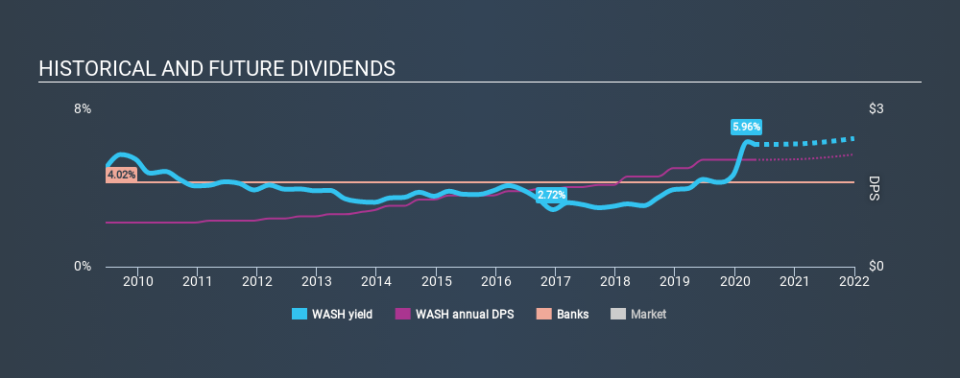Washington Trust Bancorp, Inc. (NASDAQ:WASH) Is An Attractive Dividend Stock - Here's Why

Could Washington Trust Bancorp, Inc. (NASDAQ:WASH) be an attractive dividend share to own for the long haul? Investors are often drawn to strong companies with the idea of reinvesting the dividends. If you are hoping to live on the income from dividends, it's important to be a lot more stringent with your investments than the average punter.
A high yield and a long history of paying dividends is an appealing combination for Washington Trust Bancorp. It would not be a surprise to discover that many investors buy it for the dividends. There are a few simple ways to reduce the risks of buying Washington Trust Bancorp for its dividend, and we'll go through these below.
Explore this interactive chart for our latest analysis on Washington Trust Bancorp!
Payout ratios
Companies (usually) pay dividends out of their earnings. If a company is paying more than it earns, the dividend might have to be cut. Comparing dividend payments to a company's net profit after tax is a simple way of reality-checking whether a dividend is sustainable. In the last year, Washington Trust Bancorp paid out 56% of its profit as dividends. A payout ratio above 50% generally implies a business is reaching maturity, although it is still possible to reinvest in the business or increase the dividend over time.
Remember, you can always get a snapshot of Washington Trust Bancorp's latest financial position, by checking our visualisation of its financial health.
Dividend Volatility
One of the major risks of relying on dividend income, is the potential for a company to struggle financially and cut its dividend. Not only is your income cut, but the value of your investment declines as well - nasty. Washington Trust Bancorp has been paying dividends for a long time, but for the purpose of this analysis, we only examine the past 10 years of payments. The dividend has been stable over the past 10 years, which is great. We think this could suggest some resilience to the business and its dividends. During the past ten-year period, the first annual payment was US$0.84 in 2010, compared to US$2.04 last year. Dividends per share have grown at approximately 9.3% per year over this time.
Dividends have grown at a reasonable rate over this period, and without any major cuts in the payment over time, we think this is an attractive combination.
Dividend Growth Potential
Dividend payments have been consistent over the past few years, but we should always check if earnings per share (EPS) are growing, as this will help maintain the purchasing power of the dividend. Washington Trust Bancorp has grown its earnings per share at 8.4% per annum over the past five years. Earnings per share are growing at an acceptable rate, although the company is paying out more than half of its profits, which we think could constrain its ability to reinvest in its business.
Conclusion
When we look at a dividend stock, we need to form a judgement on whether the dividend will grow, if the company is able to maintain it in a wide range of economic circumstances, and if the dividend payout is sustainable. First, we think Washington Trust Bancorp has an acceptable payout ratio. That said, we were glad to see it growing earnings and paying a fairly consistent dividend. Washington Trust Bancorp has a credible record on several fronts, but falls slightly short of our standards for a dividend stock.
Market movements attest to how highly valued a consistent dividend policy is compared to one which is more unpredictable. Meanwhile, despite the importance of dividend payments, they are not the only factors our readers should know when assessing a company. To that end, Washington Trust Bancorp has 2 warning signs (and 1 which is a bit unpleasant) we think you should know about.
If you are a dividend investor, you might also want to look at our curated list of dividend stocks yielding above 3%.
If you spot an error that warrants correction, please contact the editor at editorial-team@simplywallst.com. This article by Simply Wall St is general in nature. It does not constitute a recommendation to buy or sell any stock, and does not take account of your objectives, or your financial situation. Simply Wall St has no position in the stocks mentioned.
We aim to bring you long-term focused research analysis driven by fundamental data. Note that our analysis may not factor in the latest price-sensitive company announcements or qualitative material. Thank you for reading.

